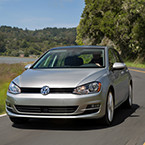Volkswagen Group will embark on one of the biggest recalls in European automotive history, affecting about 8.5 million vehicles in the EU, after German authorities threw out the carmaker’s proposal for voluntary repairs, the Bloomberg news agency has announced.
Germany's motor transport authority (KBA) demanded a recall of cars in Germany after reviewing proposals VW filed last week to fix cars fitted with software designed to cheat on pollution tests, German Transport Minister Alexander Dobrindt said in Berlin.
The mandatory recall is the basis for callbacks throughout Europe, where diesel accounts for more than half the market.
VW will contact customers and inform them direct, VW said in a statement. VW brand has set up websites in various countries where customers can enter the chassis number of their vehicle to find out is their vehicles affected. Similar customer websites are active for the Audi, Seat and Skoda brands.
Germany’s rare public snub to its biggest carmaker came after VW circumvented emissions regulations starting in 2008. Germany’s demands will speed a process that VW said will last beyond 2016, and give authorities more control.
“The KBA’s decision opens up the possibility of a common and coordinated response in all European Union states,” VW Group CEO Matthias Mueller wrote to Dobrindt in a letter obtained by Bloomberg. “Such a unified procedure would be in the European spirit as well as in the interests of customers.”
Biggest recall
The 8.5 million affected cars represent slightly less than one-third of VW’s auto deliveries in the region from 2009 to August, based on sales figures the company published for the five divisions involved.
The recall of 2.4 million cars in Germany is also the country’s biggest since its current rules for callbacks took effect in 1997, more than the record 1.9 million cars the entire auto industry brought back in under repair programs last year, according to data from the Center for Automotive Management in Bergisch Gladbach, Germany.
“It’s an unusual measure to be ordering a mandatory recall,” said Arndt Ellinghorst, a London-based analyst with Evercore ISI. “It shows to me that the KBA is losing patience with VW’s slow response on what to do to fix the engines so far. Customers have been left unsettled.”
The mandatory recall will be more expensive for VW because the company will need to work on the cars more quickly, Ellinghorst said. The manufacturer has yet to specify exactly how it will fix the cars, though it has said some will require only a software update while others will need new or rebuilt engine parts.
VW must share technical details of its fix with authorities by mid-November, and the recall will begin in January. The KBA will test vehicles to ensure the repairs were successful, Dobrindt said.
New parts necessary to fix some vehicles will probably be ready by next September, he said. Throughout Europe, Dobrindt has estimated that VW will probably need to exchange or rebuild parts for about 3.6 million engines.






